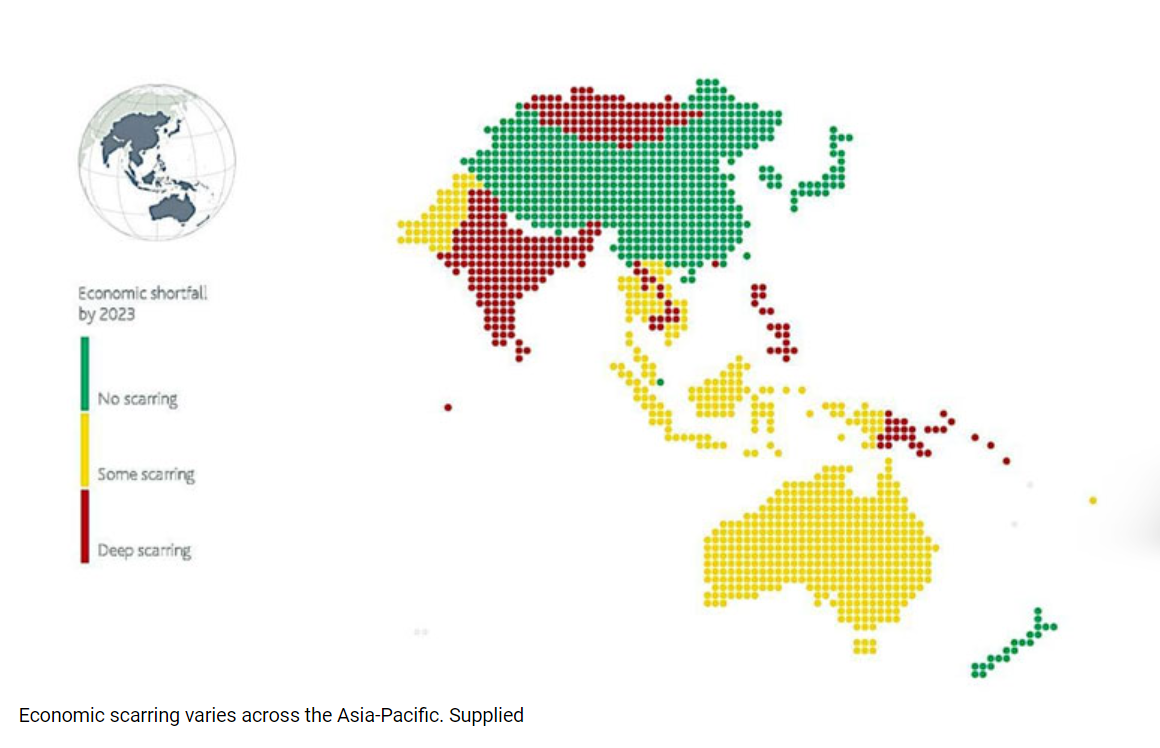APAC economies face post-Covid ‘economic scarring’ experts warn
Asia-Pacific economies will outstrip their global peers this year and next, according to Moody’s Investors Service. But the rebound masks deep scars from the Coronavirus pandemic, according to the world’s biggest ratings company.
“We forecast about 30 percent of APAC economies will face a modest degree of scarring, experiencing an output decline of between 2 percent and 8 percent below our pre-pandemic forecast Gross Domstic Product (GDP) levels by 2023. These include mainly lower-to-upper middle-income economies and those struggling to contain a virus resurgence, such as Malaysia, Indonesia and Thailand,” said Moody’s analyst Deborah Tan.
Tan warns that more than 40 percent of the region’s economies will have output losses more than 8 percent higher than the company’s pre-pandemic forecasts. The hardest-hit will be lower-middle income economies with high debt burdens, which will make it harder for governments to maintain growth as Covid-19 continues to spread across the region.
With the Delta strain causing a third wave of Coronavirus in Southeast Asia, HSBC says tough lockdowns could hit economies hard and Europe’s biggest bank says no size fits all.
“Vietnamese and Malaysian policymakers have imposed the most stringent lockdowns, including curfews. Crucially, this means that pockets of their manufacturing sectors have seen significant disruptions, especially Vietnam, with its large electronics and textile sectors,” said economists Joseph Incalcaterra and Yun Liu. “In Indonesia, the government has imposed the most stringent restrictions since the start of the pandemic, but the impact on mobility, and thus growth, has been softer than expected. Meanwhile, the latest restrictions in Thailand have had a relatively limited impact on mobility. Measures may need to be tightened to curb record cases,” they said.
On the positive side Moody’s says nearly 30 percent of APAC economies will return to pre-crisis growth levels as soon as next year. Countries likely to experience strong post-pandemic growth will have high incomes, mature institutions, good healthcare and dynamic labour markets.
There could be Covid repercussions for the region’s economies beyond 2023, as increased automation reshapes staffing needs. On the other hand, the rise of the digital economy has not hurt spending, according to HSBC.
“Consumption should be more resilient in the face of restrictions and mobility reductions, thanks to growing e-commerce penetration and quicker fiscal disbursement,” the bank said.
Recovery in the region depends on a stepping-up of vaccination programmes, export composition and fiscal policy, it added.
“Singapore and Malaysia are best positioned, in our view, while Thailand and the Philippines have a long road ahead. As vaccinations accelerate and COVID-19 risks subside, investor focus will likely increasingly shift to the imminent elections in Malaysia, and 2022 presidential elections in the Philippines,” HSBC said.
Moody’s Investors Service forecasts 2.9 percent economic growth for Cambodia this year. Its sister company, Moody’s Analytics is slightly more pessimistic, predicting real Gross Domestic Product growth of 2.5 percent this year, down from an earlier forecast of 3.9 percent growth.
“The reduction in the forecast is due to the two waves of COVID-19 in the second quarter, in April and again in June, with the daily new caseload still relatively high. Google mobility data indicates that travel for retail and recreation purposes, a proxy for discretionary spending, remains low relative to its level between June 2020 and February of 2021. Thus, the domestic economy appears to remain weak,” said Moody’s Analytics Chief APAC Economist Steve Cochrane.
“The pace of vaccination is good…but there is still risk that cases of the Delta variant could spike again,” he added.
Prime Minister Hun Sen said over the weekend that growth could slow to 2.5 percent this year.
Source: https://www.khmertimeskh.com/50907952/apac-economies-face-post-covid-economic-scarring-experts-warn/


 English
English




